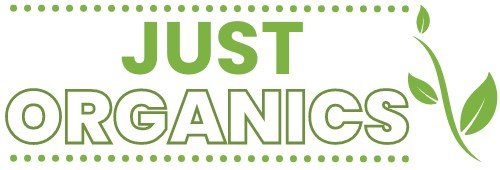Ever wondered if Aussies are increasing their organics purchases or are they decreasing due to tighter budgets and higher prices? In this article, I’ll look at Australian organic market statistics for 2023.
These statistics are from the Australian Organic Market Report 2023 and were gathered over 2021-22. You can download the report from the Australian Organic website. Australian Organic is one of the seven organic certification bodies operating in Australia.
Table of Contents
The Australian Organic Industry: Insights On Organic Farming in 2023
According to the Australian Organic Market Report 2023, the organic market is a strong and growing industry.
There are now 53 million hectares of certified organic land in Australia – that’s an area twice the size of Victoria! This comprises 70% of global organic farmland.
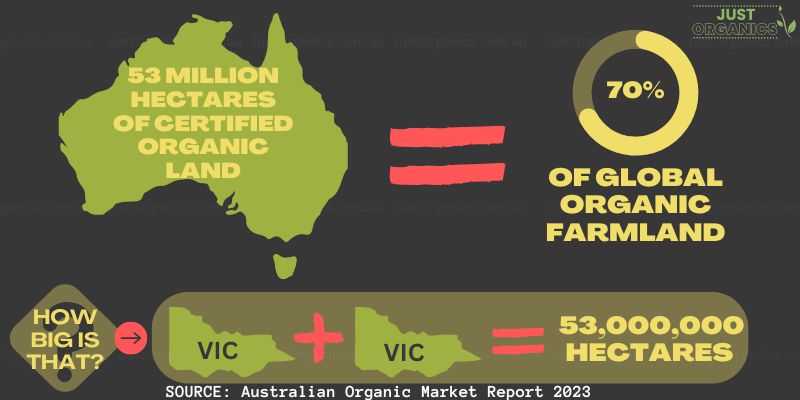
Among these 530,000 square kilometres are 3035 certified businesses. Of these, 53% are involved in the production of organic goods, 45% are involved in the processing of organic products, while 2% are both producers and processors of goods.
There is an expectation within the industry that organic farming revenue will triple over the next 5 years. In the 5 years up to the 2022, the organic sector profit margin has increased by 27%.
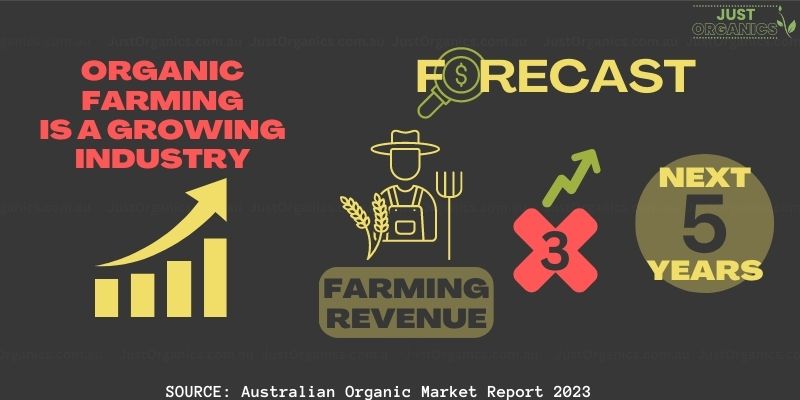
Organic produce is entering the mainstream, with supermarkets trying to win over organic shoppers. Woolworths, Coles and Aldi are now responsible for 70% of organic sales.
Australian organic produce is also being exported more than ever and exports are forecast to grow by 29% annually from 2021-22 to 2026-27. Overseas, demand for organic food is also on the rise with the US being the destination for 48% of Australian exports.
A Growing Industry: Organic Food Industry Value To The Economy and Jobs
The Organic Industry contributes $851 million to the Australian economy, with New South Wales providing the most value.
Organic operations provide 12,500 full-time jobs, with Victoria being the biggest contributor to the organic workforce.
How Has Consumer Behaviour Changed The Organic Market?
While we aren’t all changing to organic products, the households that were already buying organic are increasing their budgets.
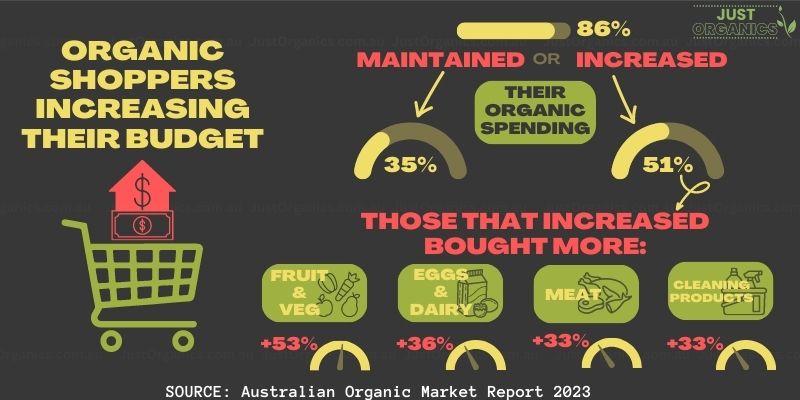
In fact, 35% of organic shoppers increased their organic spending from 2021 to 2022, and 51% maintained the same organic spending budget in 2022.
Of those that did increase their spending:
- 53% bought more fruit and vegetables
- 36% bought more eggs and dairy products
- 33% purchased more meat
- 33% increased the amount of cleaning products they bought
- 32% bought more snack items
Demographics: What Type Of People Buy Organic Products?
The report shows that the demographics of shoppers most likely to purchase organic products are:
- aged between 18 and 39 years old
- the household income of shoppers is above $40,000
- currently studying or hold a university degree
- have at least one child under 16 years old living in the home
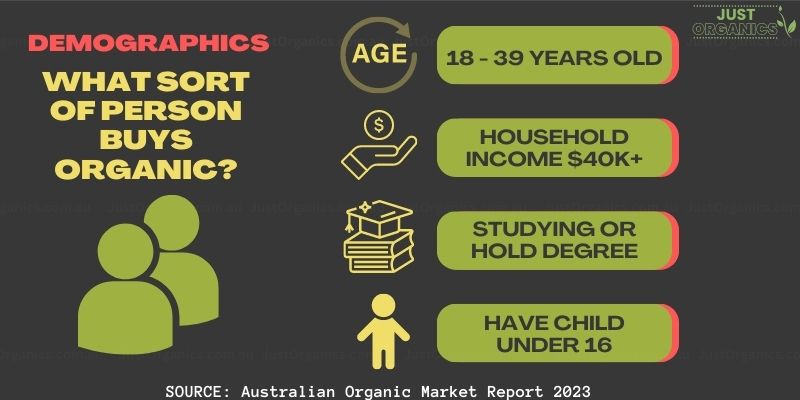
The report believes that a broad cultural change is the driving force behind organic purchases. In particular, consumers are becoming more aware of living sustainably and caring for the environment – 78% of responders said that it is important to live in a sustainable way, while 83% were concerned about environmental issues. This includes pollution like personal and plastic waste as well as toxic chemicals that impact on the environment and personal health.
80% of sustainable consumers believe that brands increase in value if they carry a message of sustainability and show empathy towards environmental issues. Consumers also have more expectations that brands look at how they package their products to reduce plastic waste. 78% of consumers consider the brand’s values when they make a purchase – it’s now more important than ever for companies to be more transparent on whether their products are ethically sourced.
An Increased Awareness Of Organic Certification
Shoppers are becoming more aware of products that are ‘certified’ as being organic. In 2019, only 59% of organic shoppers were aware of certification markings on products – 3 years on, this has increased to 77%.
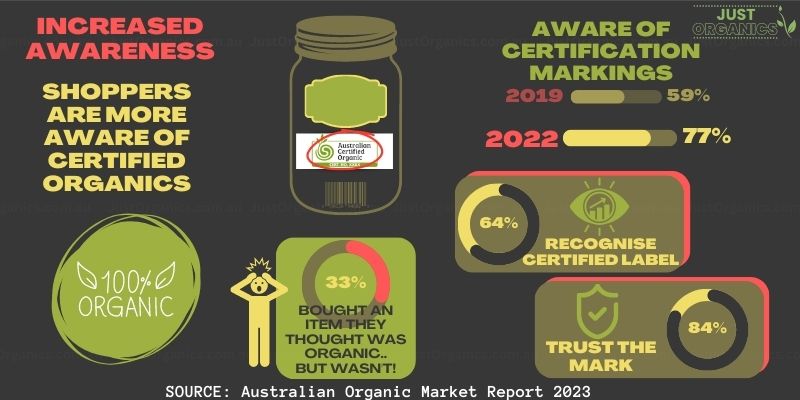
64% of shoppers are now able to recognise the Australian Certified Organic mark on products, and 84% of respondents have trust in what these certification marks represent. Interestingly, only 58% of organic shoppers said that they check for a certification logo on the product label.
Organic food products still cause issues for some shoppers – 33% say that they bought a product they believed to be organic based on what was written on the packaging, only to realise later that the product was not organic.
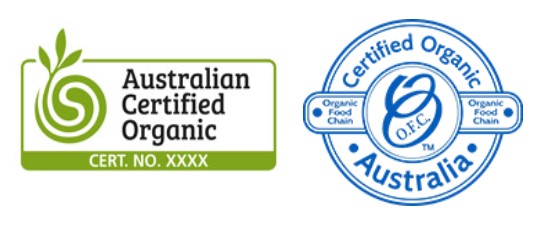
Frequently Asked Questions
What is organic food?
Organic food refers to the food grown or produced using organic farming methods, which does not involve synthetic pesticides, fertilizers, or genetically modified organisms (GMOs).
What are GMOs?
Genetically Modified Organisms (GMOs) are animals, plants, or microbes whose DNA has been altered using genetic engineering techniques.
What are some examples of organic products?
Some examples of organic products include organic fruits and vegetables, organic dairy products, and various other certified organic food items.
What is organic farming?
Organic farming is a method of cultivation that relies on biological and natural processes. It avoids the use of synthetic chemicals, pesticides, and genetically modified organisms, focusing on sustainable and environmentally friendly practices.
Why should I choose organic food?
Choosing organic food has many benefits. Organic farming methods promote soil health, biodiversity, and lower pesticide residues in food. Organic food is also free from synthetic hormones and antibiotics used in conventional farming.
How is organic food certified?
Organic food products are certified through rigorous standards set by organic certification organizations. These organisations assess the farming methods, production processes, and ingredients used to determine if the product meets the criteria for organic certification.
What are the advantages of organic farming?
Organic farming offers several advantages. It promotes soil fertility and long-term sustainability, reduces the use of synthetic chemicals, and emphasises responsible use of resources. Organic farming also helps protect biodiversity and supports the overall health of ecosystems.
If you’d like to read more about organic farming, we have an article on The Advantages and Disadvantages of Organic Farming that you might find interesting.
Is organic food more nutritious?
Organic food has been found to have similar nutritional value to conventionally grown counterparts. However, organic fruits and vegetables may have higher levels of certain nutrients and antioxidants due to variations in soil quality and farming practices.
Where can I purchase organic food?
Organic food products are widely available in organic food stores, supermarkets, farmer’s markets, and online platforms. Look for the organic certification label to ensure you are buying genuine organic products.
What is the growth rate of the organic industry?
The organic industry has been experiencing consistent growth in recent years. According to a survey, the organic industry’s growth rate is projected to continue at a steady pace in the coming years.
In Summary: How Does the Future Look For The Organic Industry?
There is great optimism within the organic food industry as well as with consumers that organic production is on the rise, particularly following the COVID pandemic. With the forecast of increasing profits over the next three years, we might see more farmers switching to sustainable agriculture practices. This is positive for both the environment and organic shoppers, who are becoming increasingly aware of traditional farming practices and the worry of health risks that may come from the use of chemicals.
People in general, are showing more concern for the environment and shopper behaviour may be shifting away from non-organic items. One barrier seems to be cost for the consumer. While the industry’s growth is impressive, organic food sales might grow further if more farmers can be convinced that moving to sustainable farming systems and practices can make them a profit.
In 2023, shoppers are more aware than ever of the strong reasons to buy organic as well as the benefits of organic produce. The rise in consumption of organic items shows that the environmental message may be getting through to consumers. And with the ever-growing amount of organic products available, there’s something there for all of us!
About the Author

ALEX
Alex is an adventurous guy in his early 30s who embodies a touch of the hippie. Passionate about social and environmental causes, he’s managed to travel the world, from immersing himself in Japanese culture for a year to embarking on a six-month backpacking escapade through Peru. Alex loves to learn and has taken numerous courses in Environmental Science and Conservation.
Alex’s commitment to recycling fuels his mission to repurpose discarded items. As a result, he favours garage sale treasures over department stores. He prefers walking and biking to driving. Alex spreads awareness about organic living through Just Organics, joined by his like-minded friend Charlie.
